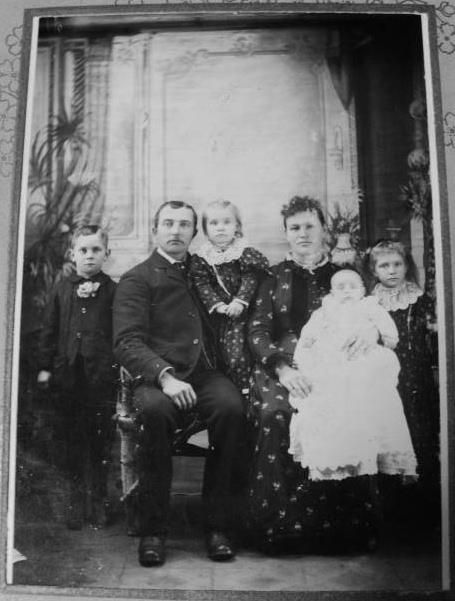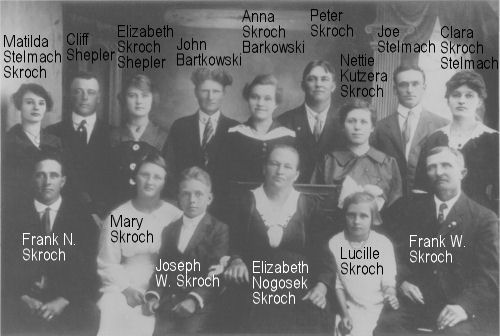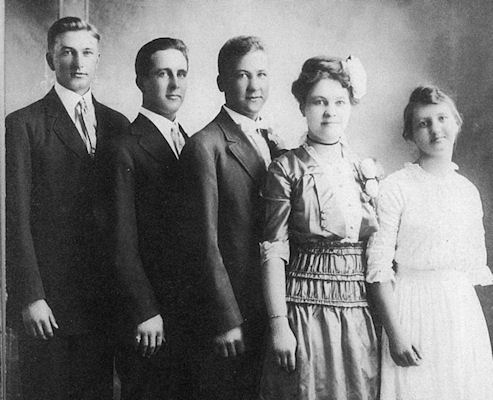Detail: Frank Skroch
Note: Frank's first wife is is his grandfather's
granddaughter.
Frank William Skroch b.11-28-1865 In
Poppelau, Opole, Poland
m1.11-27-1886 in Jamestown, Stutsman Co.,
ND m.11-5-1928 in Stutsman
Co., ND d.11-2-1939 in Jamestown,
Stutsman Co., ND (immigrated 5-18-1868 on
"Bavaria" to New York) (buried St. John's
Catholic Cemetary, Kensal, ND)

Image from John Walters
Parents: Frank William Skroch and Elizabeth
(Nogosek) Skroch
Children: (Peter Walter?), (Anna Josephine?), Frank
Nicholas on Elizabeth's lap, (Clara Gertrude?)

Frank W. Skroch Family, circa 1917, Joseph W. Skroch's
First Communion
(click image
for larger picture)
Back row (left to right):
Matilda Stelmach Skroch, Cliff Shepler, Elizabeth Skroch
Shepler, John Bartkowski,
Anna Skroch Barkowski, Peter Skroch, Nettie Kutzera
Skroch, Joe Stelmach, Clara Skroch Stelmach
Front row (left to right):
Frank N. Skroch, Mary Skroch, Joseph W. Skroch,
Elizabeth Nogosek Skroch,
Lucille Skroch, Frank W. Skroch
[Image provided by Martin Pool who states
"Attached is a family photo of my great-grandfather
Frank W. Skroch (1865 - 1939) taken circa 1917 on the
occasion of my grandfather Joseph W. Skroch's first
communion. The photo was sent to me by my aunt
Elizabeth "Betty" Skroch Brooks, Joseph's daughter."]

(Unknown ?), Frank Nicholas Skroch, (unknown ?), Anna
Josephine Skroch, (unknown ?)
Image provided by Doug Wollan, 16 Apr 2010
Frank Skroch 1865-1939
[Original source
unknown. Typed with corrections from document
provided by Melissa Hubbard, Tucson, AZ, that may have
been a biography done in the late 1930s for the North
Dakota Historical Society.]
In 1835 Matthias
Skroch was born in Poppelau, Germany, of German
Polish parents. In 1857 he was married to Anna
Neva, who too was born in Poppelau, Germany in
1837. To this union were born three boys and five
girls. Frank Skroch, our pioneer, being the third
youngest of the family. Frank’s parents moved to
the United States in 1839, when Frank was only three
years old. Mr. and Mrs. Methious Skroch moved
directly to Independence, Wisconsin as soon as they
arrived in the United States, living there until their
death. Mr. Methious Skroch died in 1898 and Mrs.
Methious Skroch died in 1922, both died in Independence,
Wisconsin. All during their lifetime, they were
thrifty German farmers.
Frank Skroch was born in Poppelau, Germany, November 28,
1865. At the age of three he came to America with
his parents. Frank helped as best he could with
all the farm work at home. In the spring of 1884,
when Frank Skroch was nineteen years old, he bought his
first class ticket for St. Paul, Minnesota.
Instead of waiting to take the train as his ticket
called for, he took the freight train, much against the
will and wishes of the conductor, but since he had a
first class ticket, he was entitled to ride on any of
their trains and any way he choose to travel--his being
the freight. Frank Skroch arrived in St. Paul the
next morning at four o’clock. This was his first
trip away from home alone and it was a great adventure
for the young man. Frank had to wait in St. Paul
until eight o’clock the same night for the next train to
come along and bring him to Dakota, as our pioneer puts
it, “It was the longest 16 hour wait I ever put in my
life, it seemed weeks instead of hours.” before his
train came. Just before the train pulled out of
the St. Paul station, the sky was grey with clouds and
it started to snow, the roads were piled high, some of
the roads north of Jamestown were piled with snow as
high as the roofs of the claim shanties.
Frank Skroch was met at the depot in Jamestown by his
Uncle Peter
Skroch. Their Uncle had been living in this
territory just a few months before Frank decided to come
to Dakota. His Uncle took Frank Skroch out to the
Seibert Farm, which is eight miles north of
Jamestown. This farm is now owned by Morris Beck
of this city. Frank Skroch worked on this farm
until November of 1884 when he decided to return to
Wisconsin for a visit. On March 4, 1885, he came
back to Jamestown and decided to go back to the Seibert
farm to work again, which he did. He stayed with
Mr. Seibert until November of 1885 this time. When
he had spare time he broke 15 acres of his own land
which had been filed on Section 28-144-63; Mr. Skroch
filed on this land in April of 1887. In April of
1887, Mr. Skroch brought a claim shanty from a nearby
claim paying $30 for it. It was fourteen by
sixteen feed in dimension. Mr. Skroch dug a nice
basement the same size of the shanty, made a lean-to ten
by sixteen, this was his first home in Dakota. As
soon as Frank had his house built, he started to make a
barn out of sod. All the farming equipment he had
was one cow.
On November 27, 1887, Frank Skroch was united in
marriage to Elizabeth Nogosek of Fried, North Dakota.
[See Nogosek
history document.] The Nogosek family had
come to Dakota a few years before Frank Skroch
did. All the Nogosek families settled out near
Fried and were all of Polish nationality, settling in
the Fried territory… [transcript unreadable ~27
characters] …Polish Catholic folk. The Polish
Catholic religious worship in Germany-hence the small
community of Fried was settled by Polish Catholic
people. Fried is located eleven miles northeast of
Jamestown, an inland town, no railroad has ever gone
through Fried, there are stores and the Catholic school,
cemetery and church in this little town of about fifty
people.
The first summer Mr. and Mrs. Skroch were Married, they
lived with the parents of Mrs. Skroch. When they
left for their new home, they were given a young heifer
by her parents as a wedding present. Besides
tilling his own land, Frank Skroch worked on the side
for George Wright, running his threshing machine in the
falloff the year from 1887-1894.
With the kind assistance of George Seibert and his
tools, Mr. Skroch was able to break up his own
land. All the stock Mr. Seibert had was one cow,
two oxen, and a team of horses. The oxen were
never used for power on the farm, they were just used
for meat. The oxen were staked out in the pasture
all the time to eat so they would be nice and fat for
butchering.
In 1887, Frank Skroch had a very good crop of oats, he
had 80 acres put in and the oats ran 80 bushels to the
acre. The oats were the White Russian Oat-it never
sold on the market, but was used for feeding purposes
only. In 1888 Mr. Skroch had another good
crop-this time it was of wheat, this wheat was sown on
new land, running 40 bushels to the acre, all number one
wheat, and sold at top price of 80 cents to one dollar
per bushel. This wheat was very dirty, had a lot
of wild buckwheat seed in it, with just a bit of time
and patience this foul seed was removed and wheat was
free of all impure seed.
June 2, 1888, a boy by the name of Peter was born to Mr.
and Mrs. Skroch. This son is living in Jamestown
at the present time. March 16, 1890 a daughter by
the name of Clara was born, she is now married and lives
in St. Paul, Minnesota. Anne was born in 1892 on
December 18, she is married to Mr. Barkoskie of Long
Prairie, Minnesota. Frank Skroch was born on
September 10, 1895, is living in Jamestown.
Elizabeth is married to Mr. Shealar of Valley City,
North Dakota, she was born on April 14, 1898.
Mary, another daughter, was born February 14, 1901, she
is married to Mr. Morris and lives in Janesville,
Wisconsin. Joe Skroch was born January 10, 1906,
he is now living in Jamestown. Lucille, the
youngest of the family, married a Mr. Folk and is now
living in Courtenay, North Dakota. She was born in
1908. Frank and Joe Skroch are both working for
the Northern Pacific Railroad in Jamestown at the
present time.
In the spring of 1919, Frank Skroch and his family left
the farm and moved to Jamestown. In 1920, Mr.
Skroch started to work for the Northern Pacific Railroad
at the beginning of the strike. His first duties
were as a guard over the lumber stock of the
company. This lumber stock was located outside the
picketed yards, which had a high board fence with two
strands of barb wire at the top. To prevent
violence to the railroad workers, they were given free
board and room within this enclosure until the strike
ended in 1921. Mr. Skroch was transferred into the
round-house as engine helper; he worked there until he
was pensioned by the railroad in 1935. At the
present time he devotes his time to the care of his nice
home on Lawrence Avenue, has a few chickens and is a
devout Catholic.
|


